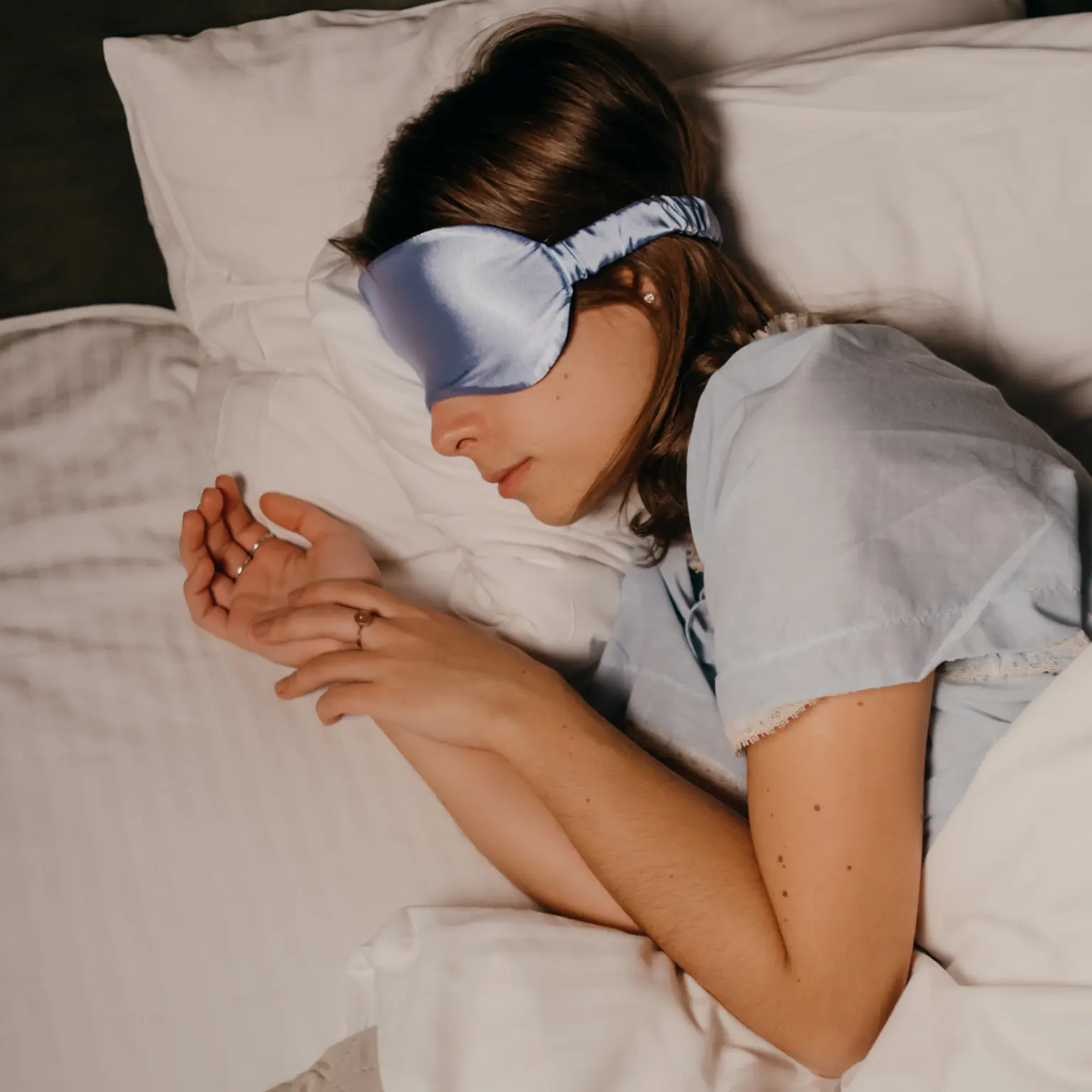Unlocking the Power of Sleep for Weight Loss: Get Better Rest, Lose More Weight

We often hear about the importance of diet and exercise for weight loss, but have you ever considered the impact of your sleep? While it might not seem like an obvious connection, the quality and quantity of your sleep can significantly influence your weight loss journey. Research has revealed a fascinating link between sleep and weight, indicating that getting sufficient rest can actually boost your efforts to shed those extra pounds.
Conversely, lack of sleep and weight gain often go hand in hand. When you’re sleep-deprived, your body undergoes hormonal changes that trigger cravings, increase appetite, and make it harder to resist unhealthy foods. So, if you’re struggling to lose weight despite your best efforts, it might be time to evaluate your sleep habits.
Healthy Stride Wellness understands the critical role of sleep in overall well-being, including weight management. In this article, we’ll delve into the science behind sleep and weight loss, provide you with practical tips for improving your sleep, and explore how optimizing your sleep can be a game-changer for your weight loss goals.
Table of Contents
Key Takeaways
- Hormones and Hunger: Discover how sleep deprivation throws your hunger and satiety hormones out of whack, leading to overeating and weight gain.
- Sleep and Metabolism: Learn how poor sleep impairs insulin sensitivity and raises cortisol levels, both of which can hinder weight loss.
- Improve Your Sleep, Improve Your Results: Explore practical tips and strategies for getting better rest and maximizing your weight loss potential.
The Science Behind Sleep and Weight Loss
The relationship between sleep and weight loss is complex, involving several interconnected mechanisms within the body. Let’s delve deeper into the science behind how lack of sleep can sabotage your weight loss efforts and how quality sleep can enhance them.
Hormonal Havoc
When you don’t get enough sleep, your body’s delicate hormonal balance gets disrupted. Two key hormones that play a crucial role in appetite regulation are ghrelin and leptin.
- Ghrelin: This hormone, known as the “hunger hormone,” signals your brain to eat. Sleep deprivation increases ghrelin levels, making you feel hungrier and increasing your desire for calorie-dense foods.
- Leptin: This hormone, often called the “satiety hormone,” signals your brain that you’re full and should stop eating. Lack of sleep decreases leptin levels, making it harder for your body to recognize when you’ve had enough food.
The combination of increased ghrelin and decreased leptin can lead to overeating and weight gain. Studies have shown that people who sleep less tend to consume more calories and have a higher body mass index (BMI) than those who get adequate sleep.
Insulin Resistance and Fat Storage
Sleep deprivation also impairs your body’s ability to use insulin effectively. Insulin is a hormone that helps regulate blood sugar levels. When your body becomes resistant to insulin, it can’t process carbohydrates as efficiently, leading to elevated blood sugar levels and increased fat storage.
Cortisol: The Stress Hormone Connection
Lack of sleep triggers the release of cortisol, the stress hormone. Elevated cortisol levels can lead to several health issues, including weight gain, particularly in the abdominal area. This is because cortisol promotes muscle tissue breakdown and increases fat storage, especially around the midsection.
Energy Expenditure and Physical Activity
When you’re well-rested, you have more energy and motivation to engage in physical activity. On the other hand, sleep deprivation can leave you feeling fatigued and less inclined to exercise. This can create a vicious cycle, as decreased physical activity can further contribute to weight gain.
Cognitive Function and Decision-Making
Sleep deprivation impairs cognitive function, including decision-making and willpower. When you’re tired, you’re more likely to make impulsive food choices and reach for unhealthy snacks. This can sabotage your weight loss efforts and make it harder to stick to a healthy eating plan.
Understanding the scientific connection between sleep and weight loss is crucial for making informed choices about your lifestyle. By prioritizing sleep and adopting healthy sleep habits, you can set yourself up for success in your weight loss journey.
How Much Sleep Do You Need Weight Loss?
You might be wondering, “Exactly how much sleep should I be getting to optimize my weight loss efforts?” While individual needs vary slightly, the general consensus among health experts is that adults should aim for 7-9 hours of sleep per night for optimal health and weight management.
Consistently sleeping less than 7 hours a night can significantly impact your weight loss journey. Studies have shown that people who sleep less tend to have a higher body mass index (BMI) and are more likely to be overweight or obese. Additionally, even a few nights of insufficient sleep can disrupt your hormones, increase cravings, and decrease your willpower to make healthy choices.
How do you know if you’re getting enough sleep? Here are some common signs of sleep deprivation:
- Daytime fatigue and drowsiness
- Irritability and mood swings
- Difficulty concentrating or focusing
- Increased cravings for sugary or high-fat foods
- Impaired judgment and decision-making
If you’re experiencing any of these symptoms, it’s a good indication that you may need to prioritize getting more sleep. Remember, sleep is not a luxury; it’s a necessity for your physical and mental well-being, and it can significantly impact your ability to lose weight and keep it off.
Tips for Improving Sleep Quality for Weight Loss
Now that we understand the significance of sleep for weight loss let’s explore actionable steps you can take to improve your sleep quality and, in turn, support your weight loss goals.
Create a Consistent Sleep Schedule
One of the most effective ways to improve your sleep is to establish a consistent sleep schedule. Go to bed and wake up at the same time each day, even on weekends. This helps regulate your body’s natural sleep-wake cycle, making it easier to fall asleep and wake up feeling refreshed.
Optimize Your Sleep Environment
Your bedroom should be a sanctuary for sleep. Ensure the room is dark, quiet, and cool. Consider using blackout curtains, earplugs, or a white noise machine to block out any disturbances. Invest in a comfortable mattress and pillows that provide adequate support.
Establish a Relaxing Bedtime Routine
Winding down before bed is crucial for signaling to your body that it’s time to sleep. Develop a relaxing bedtime routine that you follow consistently. This could include activities like reading a book, taking a warm bath, practicing gentle yoga or stretching, listening to calming music, or meditating.
Limit Screen Time Before Bed
The blue light emitted from electronic devices like smartphones, tablets, and laptops can suppress melatonin production, a hormone that regulates sleep. Avoid screen time at least an hour before bed. If you must use electronic devices, consider using blue light filters or glasses.
Watch Your Diet
What you eat and drink can significantly affect your sleep. Avoid caffeine and alcohol before bed, as they can interfere with sleep quality. Additionally, heavy meals close to bedtime can cause indigestion and disrupt sleep.
Create a Sleep-Conducive Diet
Certain foods can actually promote sleep. Tryptophan, an amino acid found in turkey, chicken, and dairy, is converted into melatonin in the body. Magnesium, found in nuts, seeds, and leafy green vegetables, can also help relax muscles and promote sleep.
Regular Exercise
Regular physical activity can improve sleep quality. However, avoid vigorous exercise too close to bedtime, as it can make it harder to fall asleep.
By implementing these tips, you can create a sleep-friendly environment and routine that promotes restful sleep and supports your weight loss efforts.
Common Sleep Disorders and Their Impact on Weight Loss
While adopting healthy sleep habits is crucial, sometimes underlying sleep disorders can hamper your ability to get a good night’s rest. Certain sleep disorders have been linked to weight gain and can sabotage your weight-loss efforts.
Sleep Apnea
Sleep apnea is a common disorder characterized by pauses in breathing during sleep. These pauses can last seconds to minutes and occur multiple times throughout the night. The most common type of sleep apnea, obstructive sleep apnea (OSA), occurs when the muscles in the back of the throat relax and block the airway.
Sleep apnea can significantly impact weight loss in several ways:
- Hormonal Imbalance: Sleep apnea disrupts the normal production of hormones that regulate appetite and metabolism, leading to increased hunger and cravings.
- Increased Cortisol Levels: The fragmented sleep caused by sleep apnea triggers the release of cortisol, the stress hormone, which can promote weight gain, especially around the abdomen.
- Fatigue and Reduced Physical Activity: People with sleep apnea often experience excessive daytime sleepiness and fatigue, making it difficult to find the energy to exercise and stay active.
If you suspect you may have sleep apnea, it’s important to consult a doctor for diagnosis and treatment. Treatment options like continuous positive airway pressure (CPAP) therapy can significantly improve sleep quality and potentially support weight loss efforts.
Insomnia
Insomnia is a sleep disorder characterized by difficulty falling asleep or staying asleep. It can be caused by various factors, including stress, anxiety, medical conditions, or certain medications.
Insomnia can negatively impact weight loss in several ways:
- Hormonal Imbalance: Like sleep apnea, insomnia disrupts hormone regulation, leading to increased appetite and cravings.
- Fatigue and Reduced Motivation: Chronic fatigue caused by insomnia can make it difficult to exercise and maintain a healthy diet.
- Emotional Eating: Insomnia can trigger emotional eating, as people turn to food for comfort or to cope with sleeplessness.
If you’re struggling with insomnia, there are various treatment options available, including cognitive behavioural therapy for insomnia (CBT-I), relaxation techniques, and medication. Addressing insomnia can improve your sleep quality and support your weight loss goals.
Restless Legs Syndrome (RLS)
Restless legs syndrome (RLS) is a neurological disorder characterised by an irresistible urge to move the legs, usually accompanied by uncomfortable sensations. These symptoms often worsen at night, making it difficult to fall asleep and stay asleep.
The sleep disruption caused by RLS can indirectly contribute to weight gain by:
- Hormonal Imbalance: Fragmented sleep can disrupt hormone regulation, affecting appetite and metabolism.
- Fatigue and Reduced Activity: Daytime fatigue caused by RLS can decrease motivation for exercise and physical activity.
If you experience symptoms of RLS, consult a doctor for diagnosis and treatment. Treatment options like medication and lifestyle changes can help alleviate symptoms and improve sleep quality.
By understanding the link between sleep disorders and weight loss, you can take proactive steps to address any underlying issues and prioritize quality sleep for optimal health and well-being.
When to Seek Professional Help for Sleep Issues?
While lifestyle changes and healthy sleep habits can significantly improve sleep quality for many, sometimes underlying sleep disorders or chronic sleep problems require professional intervention. If you’re struggling with persistent sleep issues that are affecting your weight loss goals and overall well-being, it’s crucial to seek guidance from a healthcare professional or sleep specialist.
Here are some signs that it’s time to consult a professional
- Chronic Sleep Deprivation: If you consistently get less than 7 hours of sleep per night and experience persistent daytime fatigue, it’s time to seek help. Chronic sleep deprivation can have serious health consequences, including weight gain and increased risk of chronic diseases.
- Loud Snoring or Gasping for Air During Sleep: These could be signs of sleep apnea, a potentially serious sleep disorder that requires medical attention. Sleep apnea can disrupt sleep, contribute to weight gain, and increase the risk of cardiovascular problems.
- Difficulty Falling Asleep or Staying Asleep Despite Good Sleep Habits: If you’ve tried implementing healthy sleep practices but still struggle with insomnia, a sleep specialist can help identify the underlying causes and recommend appropriate treatment options.
- Unexplained Weight Gain or Difficulty Losing Weight Despite Diet and Exercise: If you’re following a healthy diet and exercise plan but still struggling to lose weight, underlying sleep problems could be a contributing factor. Consulting a healthcare professional can help you rule out any sleep-related issues.
A doctor or sleep specialist can assess your individual situation, conduct sleep studies if necessary, and recommend appropriate treatments or therapies to address your specific sleep issues. Remember, quality sleep is essential for overall health and well-being, and addressing any underlying sleep problems can significantly improve your quality of life and support your weight loss journey.
Don’t hesitate to seek professional help if you’re struggling with sleep. It’s an investment in your health and well-being that can pay off in numerous ways, including helping you achieve your weight loss goals.
Case Studies: The Impact of Sleep on Weight Loss Success Stories
Real-life examples and research studies provide compelling evidence of the profound impact that sleep can have on weight loss outcomes. Let’s delve into a few case studies that highlight the transformative power of prioritizing sleep:
Case Study 1: Sarah’s Sleep Transformation
Sarah, a 35-year-old woman struggling with weight loss, decided to prioritize her sleep after learning about the connection between sleep and weight gain. She established a consistent sleep schedule, optimized her sleep environment, and adopted a relaxing bedtime routine. After several weeks of prioritizing sleep, Sarah noticed a significant reduction in her cravings for unhealthy foods, increased energy levels, and improved mood. As a result, she found it easier to stick to her healthy eating plan and exercise routine, leading to steady weight loss and improved overall well-being.
Case Study 2: The Nurses’ Health Study
A landmark study known as the Nurses’ Health Study followed over 68,000 women for 16 years. The study found that women who slept 5 hours or less per night were 15% more likely to become obese than women who slept 7 hours per night. This research provides strong evidence of the link between short sleep duration and increased risk of weight gain and obesity.
Research Findings
Numerous studies have demonstrated the positive impact of sleep on weight loss:
- A study published in the Annals of Internal Medicine found that individuals who increased their sleep duration from 6.5 hours to 8.5 hours per night lost more fat and preserved more muscle mass during a calorie-restricted diet compared to those who maintained their shorter sleep duration.
- Another study published in the American Journal of Clinical Nutrition found that participants who slept for 5.5 hours per night lost 55% less body fat and 60% more lean muscle mass than those who slept for 8.5 hours per night, even though both groups consumed the same amount of calories.
- Research has also shown that sleep deprivation can increase levels of the hunger hormone ghrelin by as much as 28% and decrease levels of the satiety hormone leptin by 18%. This hormonal imbalance can lead to increased appetite, cravings, and overeating.
These case studies and research findings underscore the importance of prioritising sleep for successful weight loss. By making sleep a priority, you’re not only improving your overall health but also setting the stage for sustainable weight management.
ou and achieve the restful sleep you need to support your weight loss goals and overall well-being.
Overall
Prioritizing sleep is not just about feeling rested and refreshed. It’s a powerful tool that can significantly impact your weight loss journey. By understanding the intricate relationship between sleep and weight loss, you can make informed choices that support your goals and overall well-being.
Here are the key takeaways to remember:
- Sleep Deprivation Sabotages Weight Loss: Lack of sleep disrupts hormones, increases cravings, impairs insulin sensitivity, raises cortisol levels, and decreases energy expenditure, all of which contribute to weight gain.
- Quality Sleep Enhances Weight Loss: Getting enough sleep helps regulate hormones, improve insulin sensitivity, reduce stress, increase energy levels, and enhance cognitive function, all of which support healthy weight management.
- Aim for 7-9 Hours: Strive for 7-9 hours of sleep per night for optimal weight loss and overall health.
- Adopt Healthy Sleep Habits: Create a consistent sleep schedule, optimize your sleep environment, establish a relaxing bedtime routine, limit screen time before bed, and watch your diet.
- Seek Help if Needed: If you’re struggling with chronic sleep problems or suspect a sleep disorder, consult a healthcare professional or sleep specialist.
Healthy Stride Wellness believes sleep is not a luxury but a fundamental pillar of health and weight management. By prioritising sleep and making it a non-negotiable part of your routine, you can unlock its transformative power and achieve your weight loss goals while enjoying improved overall well-being.
Ready to embrace the power of sleep for weight loss? Explore more insightful articles and resources on Healthy Stride Wellness to learn more about nutrition, exercise, stress management, and other healthy habits that can support your journey to optimal health and wellness. Remember, a well-rested you is a healthier and happier you!
FAQs
Can lack of sleep really cause weight gain?
Yes, studies have shown a strong link between sleep deprivation and weight gain. Lack of sleep disrupts hormones that regulate appetite and metabolism, leading to increased hunger, cravings, and fat storage.
How much sleep do I need for weight loss?
Most adults need 7-9 hours of sleep per night for optimal health and weight management.
What are some tips for improving sleep quality?
Create a consistent sleep schedule, optimize your sleep environment, establish a relaxing bedtime routine, limit screen time before bed, and watch your diet.
Please Note: Healthy Stride Wellness provides educational content and is not a replacement for medical advice. Consult a healthcare provider for any health issues.




